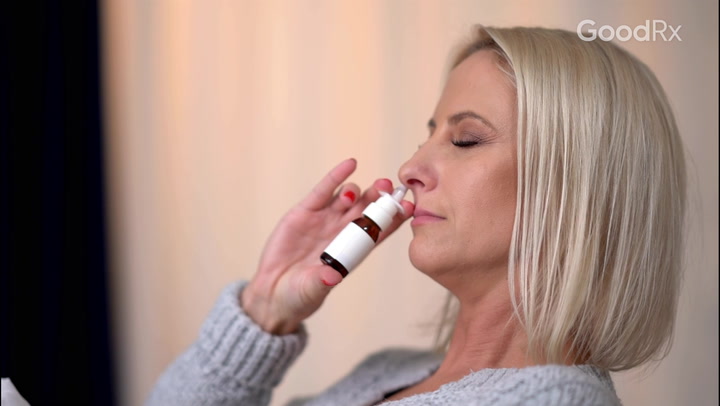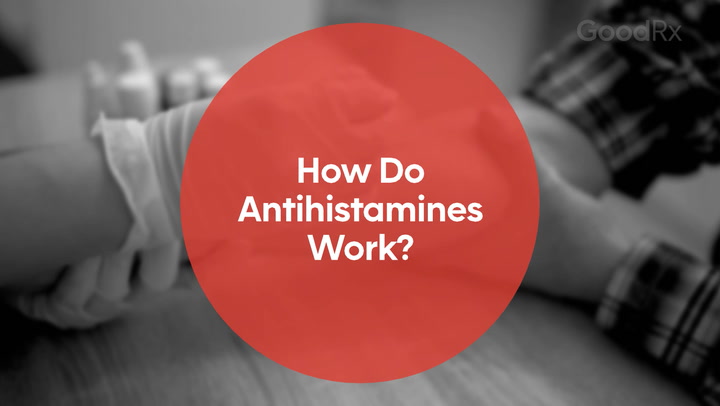
Zyrtec vs. Claritin vs. Allegra: Which Works Best for Allergies?
Key takeaways:
Allegra (fexofenadine), Claritin (loratadine), and Zyrtec (cetirizine) are over-the-counter (OTC) antihistamines used to treat allergies. They’re all similarly effective, but you may find that one works better for you.
These three medications are all labeled as “non-drowsy antihistamines” because they cause less drowsiness than older antihistamines, such as Benadryl (diphenhydramine). However, Zyrtec is more likely to make you sleepy than Claritin or Allegra.
Other OTC allergy medications include nasal steroids, such as Flonase (fluticasone propionate) and decongestants, such as Sudafed (pseudoephedrine). Your prescriber or pharmacist can help you choose the best treatment for your allergies.
Access savings on related medications
Table of contents

Allergies are common, with more than 100 million people in the U.S. experiencing some type of allergy symptoms each year. If you have allergies, you know how bothersome these symptoms — a runny nose, itchy eyes, sneezing, and more — can be.
Fortunately, there are several over-the-counter (OTC) medications that can help. Zyrtec (cetirizine), Claritin (loratadine), and Allegra (fexofenadine) are examples of popular OTC antihistamines.
It can be hard deciding between Zyrtec, Claritin, and Allegra — or maybe something else altogether. You can start by finding out more about how they work, what side effects you can expect, and what the alternatives are.

Zyrtec vs. Claritin vs. Allegra: Which is the best allergy medicine?
In general, Zyrtec, Claritin, and Allegra are all similarly effective for treating allergies. But some studies suggest Allegra might work slightly better for eye-related symptoms. And Claritin may be slightly less effective than other similar antihistamines. But overall, experts don’t recommend one of these three antihistamines over the others.
Typically, many people find that one antihistamine works better for them or causes fewer side effects. But if you’re unsure which to try first, there are a few differences between them to consider. For example, Zyrtec tends to start working slightly faster than Claritin or Allegra, but it has a higher chance of causing drowsiness.
In general, antihistamines tend to be more effective when started before you are exposed to an allergen. And each of these medications can be taken daily if needed.
In the table below, we compare some specifics of Zyrtec, Claritin, and Allegra. This might give you some insight into which one may be best for you.
Onset | |||
Duration | About 24 hours | About 24 hours | About 24 hours |
Common side effects | Drowsiness, sore throat, dizziness, dry mouth | Headache, dizziness, dry mouth, fatigue (rare) | Headache, indigestion, back pain, dry mouth |
Situations that may require a dosage adjustment | Lower dose needed if you have liver or kidney problems | Lower dose needed if you have liver or kidney problems | Lower dose needed if you have kidney problems |
Cost for a 30-day supply (generic) | Lowest price with a GoodRx coupon: as low as $3.16 | Lowest price with a GoodRx coupon: as low as $5.94 | Lowest price with a GoodRx coupon: as low as $7.66 |
Keep in mind that even though these medications are available OTC, in order to get a discount with a GoodRx coupon, you’ll need a prescription for them.
Zyrtec vs. Claritin vs. Allegra: How do they work?
Zyrtec, Claritin, and Allegra belong to a class of medications called antihistamines. Antihistamines, as the name suggests, work against histamine. Histamine is a chemical in the body that is released when the immune system is fighting allergens, which causes allergy symptoms. Zyrtec, Claritin, and Allegra prevent histamine from causing allergy symptoms.
What kind of allergies do Zyrtec, Claritin, and Allegra treat?
Zyrtec, Claritin, and Allegra are most commonly taken to treat seasonal and year-round (perennial) allergies in people as young as 2 years old.
Your over-the-counter treatment guide: Dive deeper into the best over-the-counter options for your allergy symptoms, from decongestants to nasal sprays and more.
Alternative treatments: Some natural supplements may also help treat allergy symptoms. Learn what the experts have to say about which supplements are worth a try.
More than medication: Three people share the daily lifestyle changes that have proven effective at reducing their allergy symptoms.
But, in general, antihistamines can also help with treating chronic hives, an allergic skin condition. A large review of 34 studies found that several antihistamines — including Zyrtec, Claritin, and Allegra — were more effective than a placebo (a pill with no medication in it) at treating hives.
Good to know: Zyrtec, Claritin, and Allegra are not intended to treat life-threatening allergic reactions, such as anaphylaxis. These types of reactions are a medical emergency and require immediate care in a hospital setting.
How do the side effects of the medications differ?
Zyrtec, Claritin, and Allegra are all labeled as “non-drowsy antihistamines.” That’s because they’re less likely to cause drowsiness compared to older antihistamines, such as Benadryl (diphenhydramine). But they can still make some people drowsy. And, as mentioned above, Zyrtec is more likely to cause drowsiness than Claritin or Allegra.
Zyrtec, Claritin, and Allegra also carry a risk of other side effects. Since they are very similar medications, their side effects are more or less the same. Common ones include:
Fatigue
Dizziness
Nausea or indigestion
Rare but potentially serious side effects include:
Allergic reactions (if you’re allergic to the medication)
Excessive sleepiness if combined with alcohol or other sedating medications, such as opioids or muscle relaxers
Trouble urinating, especially if you have problems with an enlarged prostate
Worsening of certain types of glaucoma
Are there better allergy treatments?

The short answer to whether or not there are better options out there is: It depends. Antihistamines — such as Zyrtec, Claritin, and Allegra — work quickly and can usually be taken safely long term.
Nasal steroid sprays are one alternative for relief of nasal allergy symptoms. Flonase (fluticasone propionate) and Nasacort (triamcinolone) are two examples. They can take longer to work than antihistamines (up to 2 weeks for full effects). But experts consider them to be the most effective type of preventative medication for long-lasting nasal allergies.
Allergy decongestants, such as Sudafed (pseudoephedrine) and Afrin (oxymetazoline) nasal spray, work by tightening the blood vessels around the nose. They have the benefit of working quickly (about 30 minutes or less). But they aren’t recommended as first-choice or long-term treatments.
Sudafed can cause bothersome side effects, such as increased blood pressure and a high heart rate. Because of this, you shouldn’t take Sudafed for longer than 7 days without a healthcare professional’s OK. And Afrin shouldn’t be used for more than 3 days in a row. Your body can quickly become dependent on this nasal spray. So there’s a risk of having more congestion (rebound congestion) with long-term use of Afrin.
The best allergy medication for you likely depends on your symptoms, how quickly you need relief, and how you could potentially be affected by a medication’s side effects. If you have questions about the different options, talk with your healthcare team, who can help you choose the best allergy treatment.
Good to know: You can safely combine all three classes of allergy medications if needed. This is a great strategy for quick relief while longer-acting medications, such as nasal steroids, start working. But you should speak with your prescriber or pharmacist before taking more than one medication at a time. They can help make sure you’re getting the most out of your allergy treatments while staying safe.
What about Zyrtec-D, Claritin-D, and Allegra-D?
What does it mean when you see a “-D” next to Zyrtec, Claritin, and Allegra? The “D” stands for decongestant, and it means that there’s an added decongestant. In this case, pseudoephedrine (Sudafed’s active ingredient) is included in these medications.
If your allergy symptoms include sinus congestion, it may be worth considering Zyrtec-D (cetirizine / pseudoephedrine), Claritin-D (loratadine / pseudoephedrine], or Allegra-D (fexofenadine / pseudoephedrine). But these combination products aren’t safe for everyone to take.
Who should not take Zyrtec-D, Claritin-D, or Allegra-D?
Decongestants like Sudafed — and medications that contain pseudoephedrine, such as Zyrtec-D, Claritin-D, and Allegra-D — should be avoided by anyone with high blood pressure, heart disease, or hyperthyroidism (high thyroid levels). As mentioned above, decongestants work by narrowing the blood vessels in your nose. But they also narrow blood vessels in other areas of the body, including the heart and blood vessels. This can raise your blood pressure and heart rate.
It’s also a good idea for people living with diabetes to avoid decongestants. These medications can raise blood glucose (sugar) levels for people with this condition.
Check with your prescriber if you’re unsure about whether or not you can safely take a medication containing a decongestant.
The bottom line
Zyrtec (cetirizine), Claritin (loratadine), and Allegra (fexofenadine) are over-the-counter antihistamines that help relieve allergy symptoms. They’re all labeled as non-drowsy allergy medications. But Zyrtec can still cause drowsiness for some people who take it.
Zyrtec, Claritin, and Allegra are similarly effective for managing allergy symptoms. All three start working within a few hours, but Zyrtec works a bit faster than Claritin and Allegra. You can also take them on a daily basis for longer periods of time to help prevent allergy symptoms.
Always check with your healthcare team before starting a new medication. They can help you decide which medication would be safest and most effective for you.
Why trust our experts?



References
Asthma and Allergy Foundation of America. (2023). Allergy facts and figures.
Craun, K. L., et al. (2022). Fexofenadine. StatPearls.
Hong, D., et al. (2023). Efficacy of different oral H1 antihistamine treatments on allergic rhinitis: A systematic review and network meta-analysis of randomized controlled trials. Brazilian Journal of Otorhinolaryngology.
Mann, R. D., et al. (2000). Sedation with “non-sedating” antihistamines: Four prescription-event monitoring studies in general practice. British Medicine Journal.
MedlinePlus. (2019). Histamine: The stuff allergies are made of [video].
Mukamal, R. (2023). Common drugs that can worsen glaucoma. American Academy of Ophthalmology.
Naqvi, A., et al. (2022). Cetirizine. StatPearls.
National Center for Biotechnology Information. (2024). PubChem compound summary for CID 7028, pseudoephedrine.
Seidman, M. D., et al. (2015). Clinical practice guideline: Allergic rhinitis. Otolaryngology–Head and Neck Surgery.
Sharma, M., et al. (2014). H1-antihistamines for chronic spontaneous urticaria. Cochrane Database of Systematic Reviews.
Sidhu, G., et al. (2022). Loratadine. StatPearls.

























